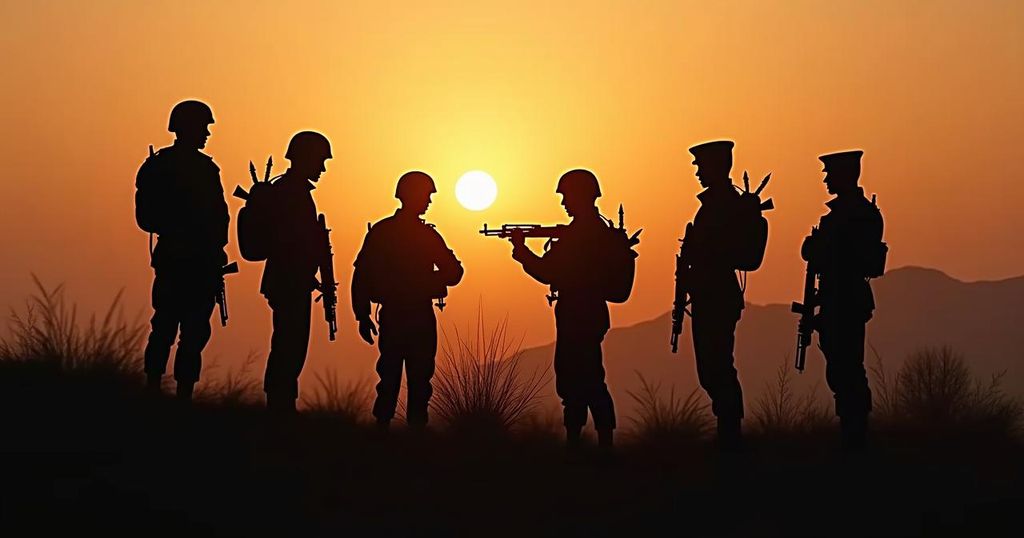Rising Military Influence in Tunisian Politics: Implications Ahead of the Presidential Election

As Tunisia prepares for its presidential election on October 6, 2023, the growing influence of the military in political affairs raises significant alarm. Historically marginalized, the military has gained considerable power, particularly since President Kais Saied’s election in 2019. His recent actions, including the appointment of military officials to high-ranking positions, have led observers to question the implications for democracy and civil governance in Tunisia, indicating a potential shift towards greater authoritarianism.
Tunisia is currently facing a significant concern regarding the increasing influence of the military in politics, particularly ahead of the presidential election slated for October 6, 2023. Historically, the Tunisian army was sidelined during the regimes of Presidents Habib Bourguiba and Zine el-Abidine Ben Ali. However, its standing began to shift post-revolution in 2011, when it gained popularity as a defender of democracy. The political landscape transformed dramatically following President Kais Saied’s election in 2019; his alignment with the military has heightened its political power extensively, culminating in the appointment of military officials to key ministerial posts—a first in Tunisia’s political history. President Saied’s tenure, particularly after his controversial consolidation of power in July 2021, involved efforts to court military favor, essential for his political maneuvers. With an imminent election that many observers deem biased, concerns about the army’s expanded role in governance are amplifying. Unlike its counterparts in Algeria, Libya, Egypt, or Syria, the Tunisian army traditionally does not wield significant political or economic power. This differentiation stems partly from President Bourguiba’s enforced military neutrality post-independence in 1956. Nonetheless, recent events suggest a growing intertwining of military influence in civil governance, especially as Saied increasingly utilizes military presence to quell dissent and stabilize his rule. The decade following the Arab Spring saw the military enhance its public role, primarily through involvement in securing elections and curbing terrorism. Investments in the military’s capabilities, largely through U.S. support, have further cemented its place in the political dialogue. Critics fear that this evolution may undermine its original democratic guardianship, especially if the upcoming election reveals an erosion of democratic values. Observers are now questioning the implications of the current political dynamic, analyzing the potential for the military to either support pluralism or elevate authoritarianism amid a government marked by increasing pressures and potential internal conflicts. The outcome of the forthcoming elections, therefore, will be crucial in determining the future trajectory of Tunisia’s political landscape, shaping the potential return to democratic norms or the consolidation of autocratic governance.
The article examines the concerning trend of the Tunisian army’s escalating involvement in the country’s political dynamics, particularly in the context of the approaching presidential elections. Traditionally marginalized under past regimes, the army’s reputation improved significantly post-2011 due to its perceived role as a protector of democracy during the revolution. The article details the extent to which President Kais Saied has aligned closely with military leaders, granting them unprecedented roles in government, which raises alarms about the erosion of democracy in Tunisia and the increasing military grip on civil political structures. The discourse is set against the backdrop of Tunisia’s unique military history and the various regional contexts of military power in the Arab world, emphasizing the distinctive nature of the Tunisian army’s current trajectory under Saied’s leadership.
The increasing involvement of the Tunisian military in politics raises significant concerns as the country approaches its presidential election. While historically, the military has acted as a stabilizing force, its recent political ascendancy, particularly under President Saied’s administration, poses fundamental questions about the future of Tunisia’s democracy. Observers are vigilant as these developments unfold, particularly in light of the upcoming election’s potential to either uphold democratic principles or further entrench authoritarianism. The outcome will significantly shape Tunisia’s political identity and the army’s role in governance moving forward.
Original Source: www.middleeasteye.net







